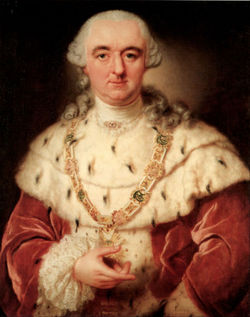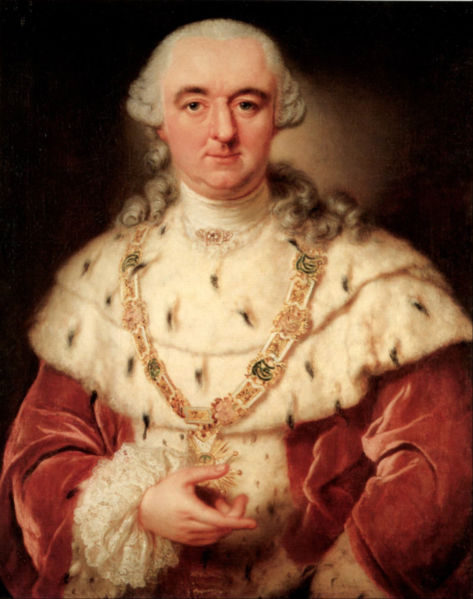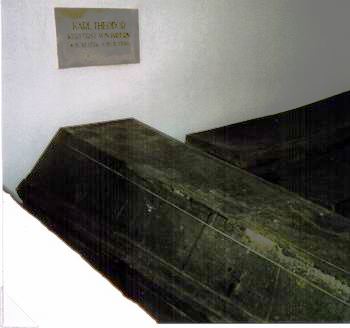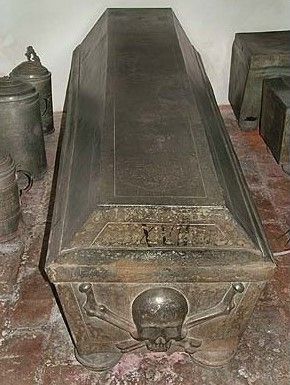Born in Drogenbos near Brussels, and educated in Mannheim, Karl Theodor inherited Electoral Palatinate in 1742. As reigning Prince of the Palatinate, he won the hearts of his subjects by founding an academy of science, stocking up the museums' collections and supporting the arts. When Maximilian III Joseph of Bavaria died in 1777, Karl Theodor became also Elector and Duke of Bavaria and moved to Munich.
He instantly managed to make everyone in Bavaria his enemy by proposing to Emperor Joseph II to exchange parts of Bavaria for some Austrian possessions along the Rhine and in today Belgium. The ensuing diplomatic crisis led to the outbreak of the War of the Bavarian Succession; in the Peace of Teschen (1779), it was established that Karl's descendants (he had no surviving legitimate children) would not inherit the throne of Bavaria.
Karl Theodor never became popular as a ruler in Bavaria; in the following years, he constantly tried without success to exchange the ducal lands of Bavaria for the Austrian Netherlands and a royal crown, and he never managed to control the mounting social tensions in Bavaria. After a dispute with Munich's city council Karl Theodor moved the residence in 1788 to Mannheim but returned only one year later. When the revolutionary armies of France invaded the Palatinate in 1795 and proceeded towards Bavaria in 1796, Karl Theodor begged Francis II for help which in essence would have made Bavaria a puppet state of Austria. When he died of a stroke in Munich in 1799, the population in Munich celebrated for several days. He is buried in the crypt of the Theatinerkirche in Munich.
Born in Drogenbos near Brussels, and educated in Mannheim, Karl Theodor inherited Electoral Palatinate in 1742. As reigning Prince of the Palatinate, he won the hearts of his subjects by founding an academy of science, stocking up the museums' collections and supporting the arts. When Maximilian III Joseph of Bavaria died in 1777, Karl Theodor became also Elector and Duke of Bavaria and moved to Munich.
He instantly managed to make everyone in Bavaria his enemy by proposing to Emperor Joseph II to exchange parts of Bavaria for some Austrian possessions along the Rhine and in today Belgium. The ensuing diplomatic crisis led to the outbreak of the War of the Bavarian Succession; in the Peace of Teschen (1779), it was established that Karl's descendants (he had no surviving legitimate children) would not inherit the throne of Bavaria.
Karl Theodor never became popular as a ruler in Bavaria; in the following years, he constantly tried without success to exchange the ducal lands of Bavaria for the Austrian Netherlands and a royal crown, and he never managed to control the mounting social tensions in Bavaria. After a dispute with Munich's city council Karl Theodor moved the residence in 1788 to Mannheim but returned only one year later. When the revolutionary armies of France invaded the Palatinate in 1795 and proceeded towards Bavaria in 1796, Karl Theodor begged Francis II for help which in essence would have made Bavaria a puppet state of Austria. When he died of a stroke in Munich in 1799, the population in Munich celebrated for several days. He is buried in the crypt of the Theatinerkirche in Munich.
Family Members
Advertisement
Explore more
Sponsored by Ancestry
Advertisement







